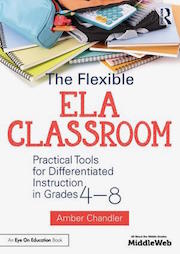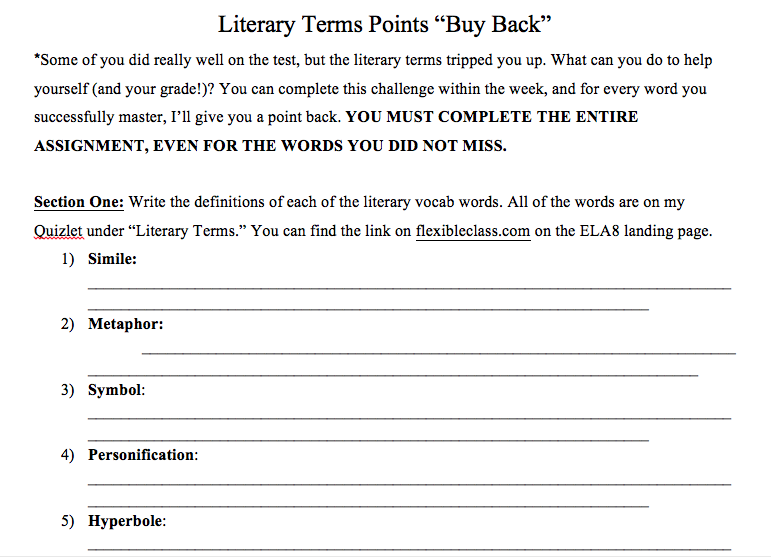Why I Let Students “Buy Back” Test Points
A MiddleWeb Blog

Watch out because the last time I went into deep reflection I eliminated homework altogether in favor of honoring students’ other passions, time with families, and the need for down time for busy brains.
This time around, I’m pondering testing. Not big league, high stakes, controversial testing, just the run-of-the-mill classroom end-of-unit test.
Great test prep, or so I thought
We had just finished reading The Giver, and I wanted to access three things that I had focused on. First, I wanted comprehension questions (which they could study on this Quizlet).
Second, I wanted to check their assessment writing skills, which I teach as a CLEeEeR paragraph (you can see this method demonstrated here using a short story). The students had access to tons of review materials on my website as well. We had practiced these paragraphs together, and I gave the students the questions ahead of time.
Third, we’d covered quite a few literary vocabulary words. We watched videos together and studied examples from the short stories we’d read as well. I felt comfortable with the fact that students who were fully present during the unit would not have to study, and that students who had missed something had the resources to prepare.
Too comfortable, as it turned out.
Vocabulary words trip up students

When I looked at the vocab section again, I realized that students didn’t know how to identify the literary vocabulary in context, even if they knew what the words meant. We’d done examples, but I clearly hadn’t drilled it down enough for all students to be successful.
Don’t get me wrong, I’m talking about 30 out of 135 students who struggled with this page, so lots of kiddos understood. What worried me though was that this page was making kids fail who had aced the rest of the test.
A duty to the 20 percent
So, I asked myself, what is the point of this test? Check comprehension, do assessment writing, and make sure students have an understanding of the literary terms we’d been adding to since the beginning of the year. Well, if I need to make sure they are learning the terms, I can’t just walk away from this test. Yet I can’t spend more class time reviewing what around 80% of the class understood. Not to mention that failing kiddos who missed one concept seemed wrong.
I’ve spent lots of time studying test design, so I know it was a balanced test. No matter. If there were 30 students who weren’t able to accomplish the learning objectives, I had to do something. As I say to my students, “This isn’t going to go away. You’ll need to know this throughout your academic career.”
I decided I’d do something I’d never tried before on a test: a points “buy back” option.
“Get your test points here”
What now? How could they earn the points back? I didn’t want them to keep working on the same examples because I didn’t want this to be a test correction. I wanted them to learn how to identify literary terms, preferably those in The Giver.
I started flipping through my well-worn copy of the book and realized that I’d used most of the obvious examples on the test. I decided I’d look to the web to see what other teachers had done with literary vocab and the book. I found a treasure trove of examples and many projects that were student made.
I used what I found to create a “Points Buy Back” assignment. (See the Resources for Literary Terms Buy Back Test Corrections, including the complete Literary Terms handout excerpted below, near end of my webpage.)
The first part is typical review of the literary terms’ meaning. The second part, though, is where the assignment hits my main objective. I send students to my website to review using the many examples I’d found online. Kiddos need to go to the resource, watch it or study it, and then record two examples. Finally, they need to create one example of their own.
Finding the exact resources to fit my needs was massively time consuming, but well worth it. I opened the “Points Buy Back” to any student, not just those who’d failed the test page. The deal was simple: complete the entire assignment, even for the words you may have gotten correct, and I’d give you the points back. If a student were to complete this assignment, I believe it would take at least an hour. In my book, studying literary vocab words for an hour couldn’t hurt anyone.
Moving toward flexible learning
This is definitely not common practice in my building, and I irritated quite a few people who heard about it. There were several complaints, but that’s what happens when you shift the paradigm from grading to learning.
I don’t blame those who question me on this because most teachers, my former self included, are rule followers for the sake of following the rules. That’s how schools have always been run. It was not until I started questioning “what’s the point of this?” that I moved from a compliant teacher to an innovative one.
Schools are built on a rigid system when, in my experience, a flexible classroom is a better learning environment for students.
The complaints — and my thoughts about each
What about the students who got a good grade the first time? Isn’t that unfair?
The students who earned a good grade the first time around lose nothing when I help my other students learn. No, it isn’t unfair. What would be unfair is if I’d forgone teaching one group of students because other students with better supports or resources or innate ability are good test takers.
Aren’t you just inflating their grades?

I understand that this would have a huge ripple effect in high school where GPA matters for college admissions and scholarships. But this is middle school. They still have the rest of the year with me to get them ready.
How are you “getting them ready” by letting them retake this part of the test?
I’m getting them ready by allowing them to experience the success that occurs when you study and prepare for a test. Having the opportunity to correct their mistakes shows them a different way to have prepared.
Student after student said, “I should have looked at this when I took the test” or “Quizlet really helped.” They are learning how to be learners, and it’s important they have the opportunity to gain a new skill by experiencing its positive results.
Aren’t all the students with high grades going to do this, while all those who should do it, won’t?

And, if “everything counts,” as I think it does, doesn’t it speak volumes about a child who is willing to do an hour assignment to improve their already good grade? It tells me that they are valuing the work that I am asking them to do, and they are willing to put the time into being the very best they can be.
As for the students who should but don’t, that’s on me to convince them!
Aren’t you just making work for yourself? This would take forever.
Yes, it was work on the frontside in creating the new assignment. However, I teach this novel year after year (going on 12 years), and the more reflective I am, the more refined the unit becomes, ultimately saving me time.
As for the work in re-grading this – out of the 35 students who missed more than three, only half took advantage of the buy-back opportunity. I did not force students to do the “buy back” because then it would not be an opportunity that they could seize, but a punishment they could resent, further turning them off to English Language Arts.
Another six students with already-good grades did the assignment again, and we all know how quick those are to grade.
What am I supposed to say when students ask to retake my test in my class?
Own your beliefs. If you think that I’m wrong, explain to the student that what works for Mrs. Chandler’s ELA class does not work for your class. I don’t even mind if you call me on it and tell them you don’t like it. Why? Because the world is full of conflicting bosses who all want things done their way, and students themselves need to be flexible too. If you want to give this idea a try, you know where to find me!
Will I do the “Points Buy Back” for other assignments?
Yes, if students will benefit, I will. In the last few years I’ve been convinced that the social and emotional lessons of middle school are at least as important as the literary terms I teach. After all, probably 99% of my students will never need to identify literary terms after high school exit exams, but all of them will need to know what to do when they have failed at something.
_________


































Your flexibility is refreshing, and I’ll bet you didn’t get any parent complaints!
At my school we allow students to retake a test that he/ she failed- do you feel that this is different from your “buy back”? I always have a different test so the students are not just doing test corrections.
Thanks so much! I pride myself on flexibility because I think it works best for all of us.
I like this idea and I will share it with others at my high school. Reassessment is a contentious topic in our school, and we’ve needed to impose the practice in two departments where student achievement was low. We are seeing improvements in student achievement, and some of the most opposed teachers have come around. I see reassessment as a way to challenge students and raise standards while providing a safety net for kids who are struggling for academic, personal, or behavioral reasons. Instead of dismissing reassessment as a “do-over” or the “how many chances are we going to give these kids” lament, I think we should say to students that not learning this content or skill is not acceptable. It sends the message that we believe and them and know they can do it.
Thanks for sharing your situation. I think we sometimes feel like we are in our own little worlds and that can make change really difficult. Trust me, not everyone loves what I’m doing either, but I’m confident that students are benefitting from the remediation. I also am really interested in seeing students emotional and social well-being getting attended to, which this does.
With that being said, I know how scary it can be to take those first steps. I encourage anyone who wants to try this to reach out!
I appreciate your approach to help kids focus on the learning! Even though the process earns them a higher grade, the lessons about how to study, and how to handle failure are of much more value than a few points on a quiz. Bravo to you! Your students are fortunate to have you as a teacher!
I really like this idea! I’ve been trying to refine the corrections/retakes process for a few years now, but this feels more straightforward and finite than my process. Do you know anyone doing a similar process with math? Thanks for your inspiration!
Karen–I’m glad to hear a math teacher interested in my Flexible Classroom philosophy! I always steer clear of math because I’m not sure how it would work. I’d love to hear how it goes for you.
Sorry! The above comment was meant for Tessa.
I enjoyed reading about your “Buy Back Test Points” immensely. Your reflection on what the purpose of the test in the first place–learning vocabulary–made so much sense. I love how you thought “outside the box” to reach students who wanted to improve their grade and therefore, their learning! I’m sharing this idea with my colleagues!
Ann–Thanks! I have long thought that students see tests as the end of the learning. I wanted to change that, so this idea was born. It really is impacting the way my students view learning. Good luck. I’d love to hear how it goes.
This concept sounds extremely interesting to me. I would be very interested in implementing this in my world languages class in middle school. We just had a disastrous experience on a Francophone World geography quiz. So many students did not know the material well! Many of these middle school students didn’t even know the names of the oceans of the world – let alone the differences between continents, countries, regions and even states! I was astonished!